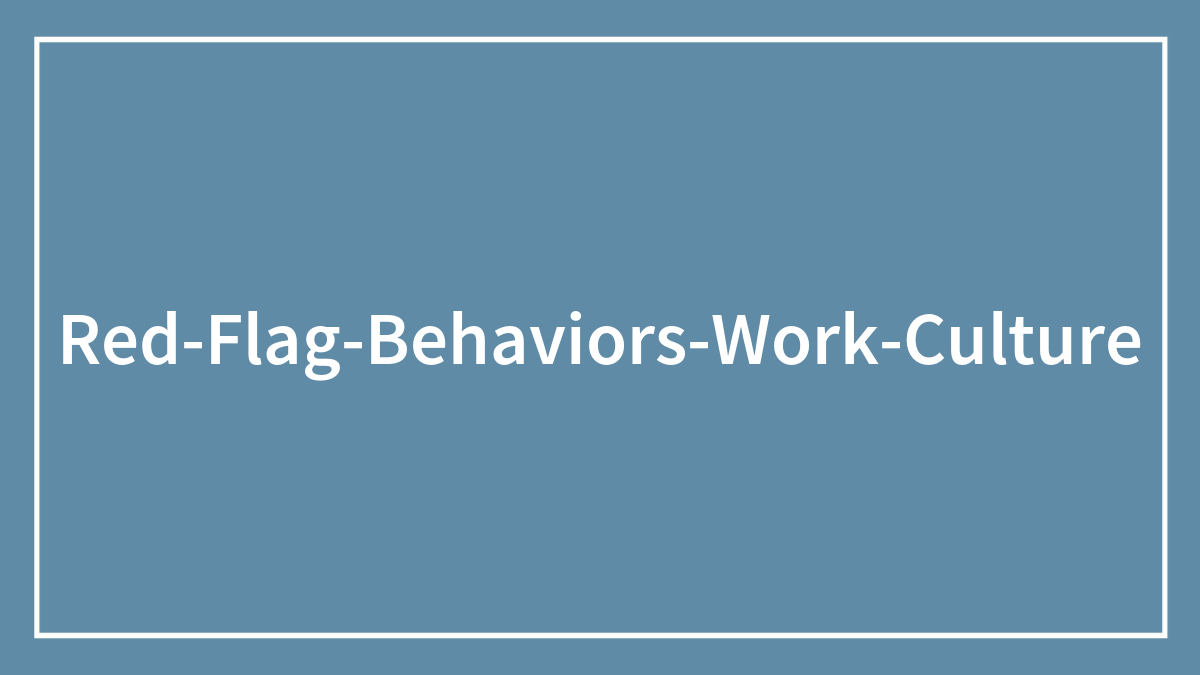
Career Coach Reveals Workplace Behaviors That Immediately Scream ‘Red Flag’
Interview With AuthorWhile some jobs out there are downright horrible, abusive and deserve to be lost and forgotten, the sad reality is that many workplaces only show their true colors later. So it can be helpful to know some danger signs.
TikToker and career coach Marissa Moyer shared her thoughts on red flags to look out for at work. We got in touch with her to learn more. So scroll through, upvote the best ones, and share your thoughts in the comments below.
@themarissamoyer@themarissamoyer Who has experienced this person?? 😩😩😩 #toxicleadership #careertiktok #redflagsatwork ♬ original sound - Career | Influence Coach
This post may include affiliate links.
 Red flag people in the workplace number 1: you know that person in a leadership position that shows one face to other people in leadership, people at or above their own level, and a completely different face to the people who report to them or who are really anywhere below them in the hierarchy. This type of person can be especially dangerous for a company culture because they're sneaky. It really takes a while to catch them, if they're ever caught, because they're very strategically presenting one face to the people at their own level. Be very guarded with these people. This is a red flag in the workplace and really any other area of life. Someone who feels really comfortable treating people they perceive to be below them poorly. This is not a respectful person. This is not a person with a lot of ethical integrity. And even if they don't treat you poorly now, as soon as you stop being useful to them, you will also be the object of that treatment.
Red flag people in the workplace number 1: you know that person in a leadership position that shows one face to other people in leadership, people at or above their own level, and a completely different face to the people who report to them or who are really anywhere below them in the hierarchy. This type of person can be especially dangerous for a company culture because they're sneaky. It really takes a while to catch them, if they're ever caught, because they're very strategically presenting one face to the people at their own level. Be very guarded with these people. This is a red flag in the workplace and really any other area of life. Someone who feels really comfortable treating people they perceive to be below them poorly. This is not a respectful person. This is not a person with a lot of ethical integrity. And even if they don't treat you poorly now, as soon as you stop being useful to them, you will also be the object of that treatment.
One of those poisonous bosses got caught doing it when one of the higher up bosses had his granddaughter working for us without telling anyone who she was. The nepo-baby was a bit of a wallflower. Timid, unassuming, tenacious. She was a really good employee and everyone liked her. But we had this nasty arrogant boss who had a special hatred for timid women. I have no idea what her problem was. And of course she treated everyone beneath her like dirt under her shoes. The nepo-baby took her abuse for several weeks, then she vanished after an especially nasty tirade. Next day she was back and the supervisor was gone. We still didn't connect the dots. She worked there for several more years. Unassuming, quiet, nice, but got steadily promoted. She was a great supervisor and a capable manager though. We still didn't know her connections. I found out from the newspaper when her granddaughter retired and she took over. I had already left. No one knew, they kept it completely hush hush.
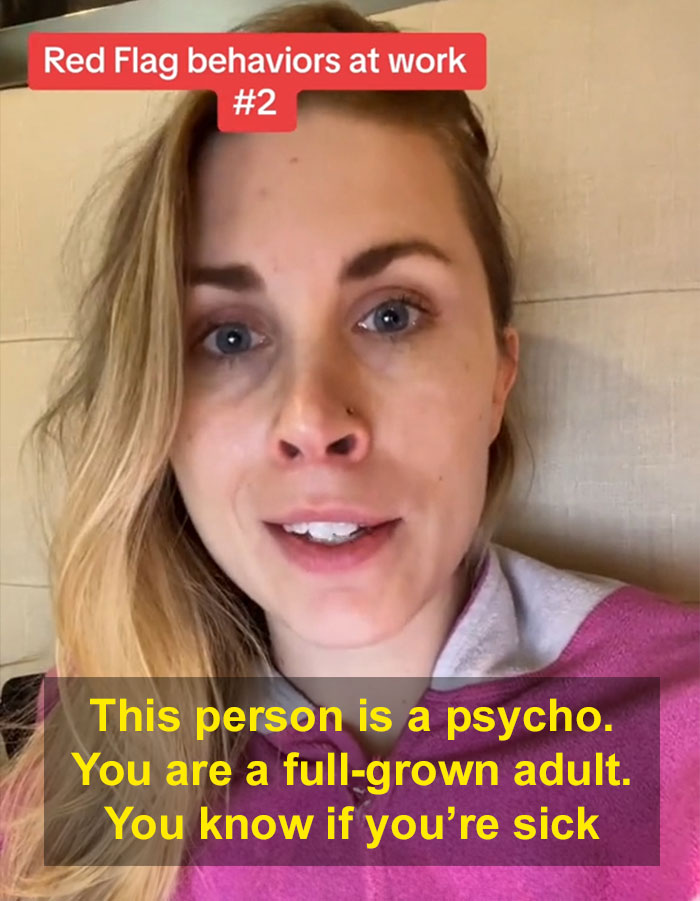 Red flag people in the workplace number 2: sickness addition. If you tell your manager that you're sick, and they REQUIRE you to go to the doctor, spend money, and get a piece of paper that says that you're sick, so that you can then hand it to them, and they can read that you are indeed sick. This person is a psycho. You are a full-grown adult. You know if you're sick. If you come back from sick leave and you're being guilt-tripped or shamed by your leader or co-workers. Those people are jerks who better hope they never get sick.
Red flag people in the workplace number 2: sickness addition. If you tell your manager that you're sick, and they REQUIRE you to go to the doctor, spend money, and get a piece of paper that says that you're sick, so that you can then hand it to them, and they can read that you are indeed sick. This person is a psycho. You are a full-grown adult. You know if you're sick. If you come back from sick leave and you're being guilt-tripped or shamed by your leader or co-workers. Those people are jerks who better hope they never get sick.
Same goes with bereavement days. When my brother—-my BROTHER, not some distant cousin—-died unexpectedly, I had to fly cross country with one of my other brothers for his funeral (we live on the same coast but in different states, so we flew into a centrally located airport to meet up and fly the rest of the way together). I was gone for four days. When I got back, I came in early because I knew there would be an extra tall pile of work on my des, and wanted some quiet time to at least prioritize it before starting work. I wasn’t even on the clock yet, and I got yelled at for it because they said it was overtime—-in a week where I had be out of the office for four days. Then they got mad when I told them I wasn’t clocked in yet! Then they insisted I get a copy of my brother’s death certificate to prove I had been to his funeral, because they didn’t be,I’ve my brother had died. I got the call from his widow at work that four days before and took the first flight out after coordinating with my other brother!!! I had to call my brother’s widow to send a copy to my work email so I could hand it to HR. All while still grieving the loss of one of my big brothers. BTW, I had NEVER taken time off for a funeral before, so there was no reason not to believe me.
Bored Panda got in touch with Marissa Moyer who made the videos you see here and she was kind enough to share her thoughts. Given the popularity of the series, we wanted to know why she thought so many people resonated with it.
“Workers are demanding more emotional intelligence than ever before from their leaders and workplace cultures. They want to work for companies that treat them like “whole humans”—individuals who not only work but also have families, interests, and lives outside of work, unique personalities, and emotional needs. They want work to be a safe place mentally and emotionally.”
“They want to finish their workday and not be exhausted by “the corporate game”, manipulation, and all of the subtle and not-so-subtle forms of mental and emotional abuse that take place in work environments. So, I think “red flag” content is so popular because people want to be able to proactively protect themselves from these cultures and behaviors. They want to feel seen and know that they are not alone in these things they’re experiencing,” she shared with Bored Panda.
 Red flag people in the workplace number 3: you know that co-worker that's on the same level as you but thinks they have authority over you. They may check your work and try to boss you around. We all know this is annoying. That's not the red flag. There's a point where this behavior goes beyond being a little difficult or overbearing, and that's what I want to talk to you about because there is a name for it. Just for the record, as a people skills and influence coach, I have a lot of empathy for difficult people at work. We all have issues but it is not your job to try to change these people. It's literally mine. You just need to protect yourself. But let's talk about how to recognize a scriptwriter at work. This is a person who has written a certain script or story in their head about you, about their leadership, about situations at work, and they are always the victim. A red flag that you, as a co-worker, need to look out for is, are they spending a crazy amount of their time collecting evidence on you, receipts of your failures or wrongdoing? Are they practically writing dossiers about you trying to prove to leadership that you are the problem, regardless of how much evidence there is to the contrary? Do they constantly express that you are out to 'get them' when you literally couldn't care less and you were just trying to do your job? If so, you could be dealing with a scriptwriter, and if you are, you are not going to change this person, you can and should set boundaries over and over and over again. But it's likely not going to stop their behavior. You have to document everything this person does to you and escalate this to your leadership, to HR, whatever your company's processes is. I am not an HR person and this is not HR advice
Red flag people in the workplace number 3: you know that co-worker that's on the same level as you but thinks they have authority over you. They may check your work and try to boss you around. We all know this is annoying. That's not the red flag. There's a point where this behavior goes beyond being a little difficult or overbearing, and that's what I want to talk to you about because there is a name for it. Just for the record, as a people skills and influence coach, I have a lot of empathy for difficult people at work. We all have issues but it is not your job to try to change these people. It's literally mine. You just need to protect yourself. But let's talk about how to recognize a scriptwriter at work. This is a person who has written a certain script or story in their head about you, about their leadership, about situations at work, and they are always the victim. A red flag that you, as a co-worker, need to look out for is, are they spending a crazy amount of their time collecting evidence on you, receipts of your failures or wrongdoing? Are they practically writing dossiers about you trying to prove to leadership that you are the problem, regardless of how much evidence there is to the contrary? Do they constantly express that you are out to 'get them' when you literally couldn't care less and you were just trying to do your job? If so, you could be dealing with a scriptwriter, and if you are, you are not going to change this person, you can and should set boundaries over and over and over again. But it's likely not going to stop their behavior. You have to document everything this person does to you and escalate this to your leadership, to HR, whatever your company's processes is. I am not an HR person and this is not HR advice
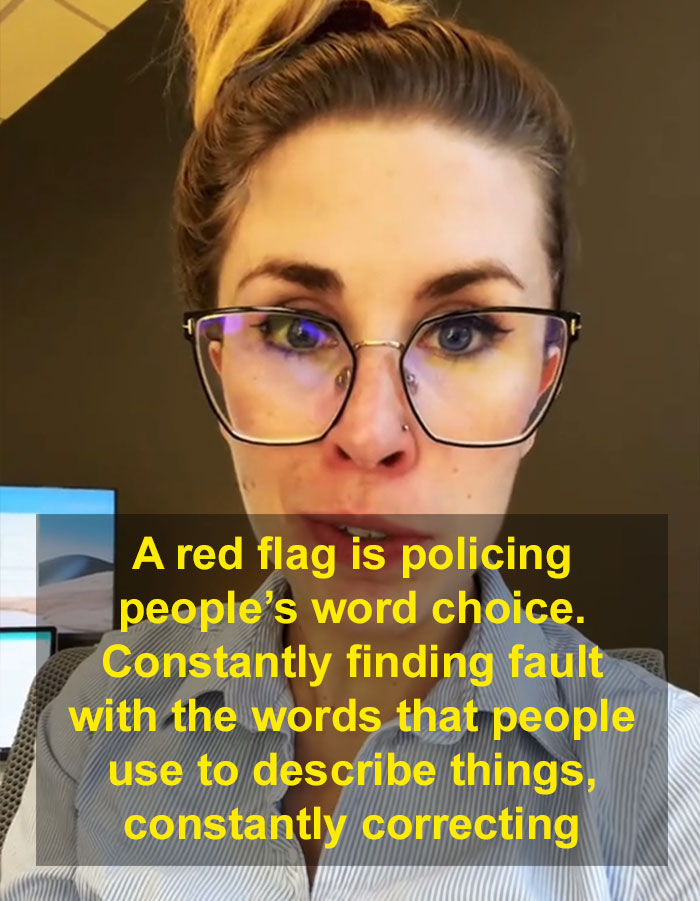 Red flag people in the workplace number 7: the person doing this is in a leadership position. It can really make people miserable. A red flag is policing people's word choice. I'm talking constantly finding fault with the words that people use to describe things, constantly correcting, constantly demanding that we dive into that word choice that you just use because I'm not sure I like the sound of that. I'm talking like a leader who will derail an entire 30 minute meeting because someone used the word 'escalate' instead of a softer word like 'advance' or something like that. This behavior can be so so harmful, and what the people who do this don't realize is that they are actually seeding deep deep resentment with the people who work with them, and they will actually grow to avoid talking to them or bring the important issues to them at all costs, because they don't feel like they know how they can even approach the issue or say something correctly. Because they know that any given word could become an issue that that person latches onto, and then the whole conversation is just derailed. Someone who does this clearly has a need for control. They have control issues, but there's something else that this tells me about a person. I find this behavior to be an avoidance tactic, especially if done by a leader. They are stressed, overwhelmed, feeling incompetent at their job, and if they can take up time and space and latch on to individual words that people are using, they don't actually have to confront real substantial issues.
Red flag people in the workplace number 7: the person doing this is in a leadership position. It can really make people miserable. A red flag is policing people's word choice. I'm talking constantly finding fault with the words that people use to describe things, constantly correcting, constantly demanding that we dive into that word choice that you just use because I'm not sure I like the sound of that. I'm talking like a leader who will derail an entire 30 minute meeting because someone used the word 'escalate' instead of a softer word like 'advance' or something like that. This behavior can be so so harmful, and what the people who do this don't realize is that they are actually seeding deep deep resentment with the people who work with them, and they will actually grow to avoid talking to them or bring the important issues to them at all costs, because they don't feel like they know how they can even approach the issue or say something correctly. Because they know that any given word could become an issue that that person latches onto, and then the whole conversation is just derailed. Someone who does this clearly has a need for control. They have control issues, but there's something else that this tells me about a person. I find this behavior to be an avoidance tactic, especially if done by a leader. They are stressed, overwhelmed, feeling incompetent at their job, and if they can take up time and space and latch on to individual words that people are using, they don't actually have to confront real substantial issues.
It's not limited to work. If you put more importance to speech than actions, you derail every meaningful discussion and hider progress. Language is the result of culture, you can't force a change by policing language. If you want a better world, you need to change the actual problems, the language will follow on it's own. A lesson many people need to learn nowadays.
On paper, much of this advice makes a lot of sense. Some might even see it as commonplace. However, as stated before the popularity of the content does indicate that many people find it useful, so we were curious to hear her take on why some folks really struggle with spotting red flags. “Honestly, most people grew up with some level of trauma or fear of people in authority positions that makes it very hard for them to question patterns or behaviors that they think are wrong. They may even believe that harmful behaviors are normal. Many companies allow, implicitly or explicitly, these things to continue happening, and people feel too small or afraid to do anything about it,” she shared. Unfortunately, this can even go beyond being a side effect of a hierarchical company and stem from “fear” being seen as a legitimate strategy in some organizations.
“Cultures are self-sustaining, and the problem is that even people in leadership who see a negative pattern often feel too small or afraid to call out harmful patterns or people. A good resource for people who are in situations where they feel like they need HR advice, but don’t trust the HR department at their company, is Caged Bird HR. They are culturally competent independent HR experts. This means they can give you unbiased HR guidance that is in Your best interest—not your company’s because they are not connected to your company in any way.”
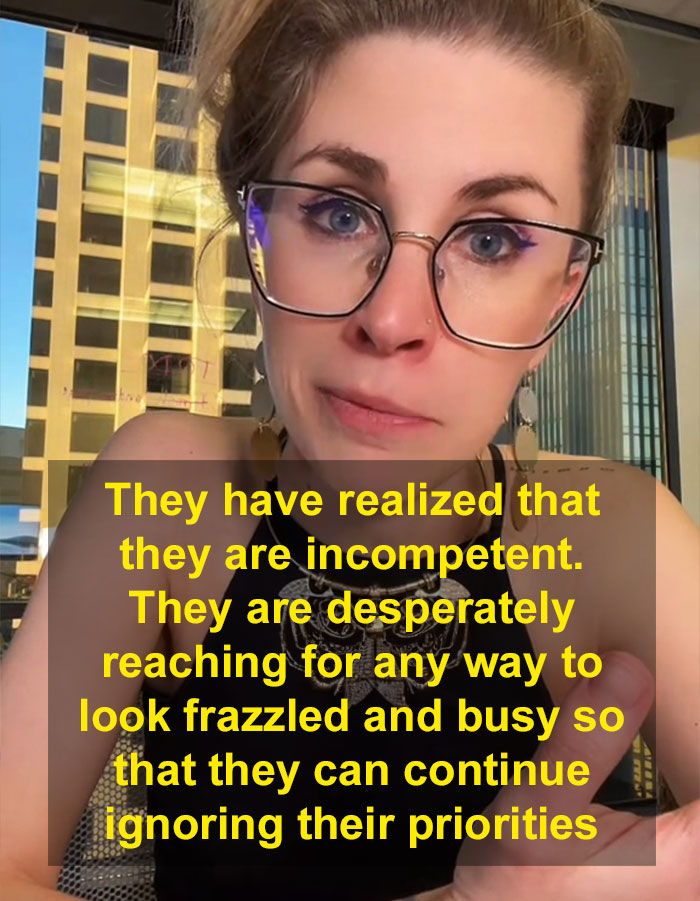 Red flag people in the workplace number 8: here's how to tell if a senior leader is in a tailspin. I'm not saying this to be a jerk. But the truth is that everyone else at the company suffers so much, when a senior leader does this, and I have seen this at least three times in my career. When a senior leader starts fixating on things that are so unimportant, so far removed from anything that is in the realm of the company's priorities, you're just sitting here waiting for all of the stuff that they're actually supposed to be doing. And they're like, obsessing over whether or not the office dishwasher is working, or they spent an entire day trying to sync some random calendar on Outlook, or they've decided that the art on the wall of some conference room has just gotta go, we gotta do something about it. That is the level of not important I'm talking about, and just about every single day, they say that the huge company-level priorities that they're supposed to be working on, are almost done. They are not doing well. They have realized that they are incompetent and they cannot handle this role. They are desperately reaching for any way to look frazzled and busy so that they can continue ignoring their priorities. If you see someone going through this and you care about them, reach out and ask them if they are okay. If not, just know that they're probably on their way out of the company anyway.
Red flag people in the workplace number 8: here's how to tell if a senior leader is in a tailspin. I'm not saying this to be a jerk. But the truth is that everyone else at the company suffers so much, when a senior leader does this, and I have seen this at least three times in my career. When a senior leader starts fixating on things that are so unimportant, so far removed from anything that is in the realm of the company's priorities, you're just sitting here waiting for all of the stuff that they're actually supposed to be doing. And they're like, obsessing over whether or not the office dishwasher is working, or they spent an entire day trying to sync some random calendar on Outlook, or they've decided that the art on the wall of some conference room has just gotta go, we gotta do something about it. That is the level of not important I'm talking about, and just about every single day, they say that the huge company-level priorities that they're supposed to be working on, are almost done. They are not doing well. They have realized that they are incompetent and they cannot handle this role. They are desperately reaching for any way to look frazzled and busy so that they can continue ignoring their priorities. If you see someone going through this and you care about them, reach out and ask them if they are okay. If not, just know that they're probably on their way out of the company anyway.
 Red flags in the workplace number 4: here's how to know if you will not be able to advance at your company with your dignity intact. A red flag is an OVER emphasis on hierarchy. Now, I am not knocking having a hierarchy, it's necessary to get things done. But if you're in a company where your ideas or other people's ideas are worth nothing, they are dismissed purely because you are junior or lower in the hierarchy, this is not a good environment for you. This is not an environment that wants you to succeed. They want it to be extremely hard for you to advance because in order for you to advance, you're gonna have to play their game by number 1: accepting being treated like cr*p, number 2: proving to them that you will maintain the toxic culture if you advance, hence the destroying of your dignity. They can't risk changing the status quo, so in order to gain any respect, you will have to act against your values and engage in the same toxic behaviors that they do in order to prove that you are one of them.
Red flags in the workplace number 4: here's how to know if you will not be able to advance at your company with your dignity intact. A red flag is an OVER emphasis on hierarchy. Now, I am not knocking having a hierarchy, it's necessary to get things done. But if you're in a company where your ideas or other people's ideas are worth nothing, they are dismissed purely because you are junior or lower in the hierarchy, this is not a good environment for you. This is not an environment that wants you to succeed. They want it to be extremely hard for you to advance because in order for you to advance, you're gonna have to play their game by number 1: accepting being treated like cr*p, number 2: proving to them that you will maintain the toxic culture if you advance, hence the destroying of your dignity. They can't risk changing the status quo, so in order to gain any respect, you will have to act against your values and engage in the same toxic behaviors that they do in order to prove that you are one of them.
To perhaps not end on such a dour note, we wanted Marissa to share some “green flags,” positive indicators one might find a company. “One of the safest behaviors you can witness in work environments is when it is ok to question things. If you are not allowed to question anything in your environment, this is cult-like behavior.”
“A healthy culture is not afraid of that. Along those same lines, when people in leadership positions can admit to setbacks, mistakes, and failures—and then make a plan to address them, and actually follow through—this is a huge green flag. No workplace is perfect! A safe workplace is not one that doesn’t have problems or problematic people—it’s about how they handle it. Do they take action within a reasonable timeframe? Do they take steps to protect employees from any further harm? Do they have a growth mindset? Are they transparent when they can’t do anything about a problem at this time?”
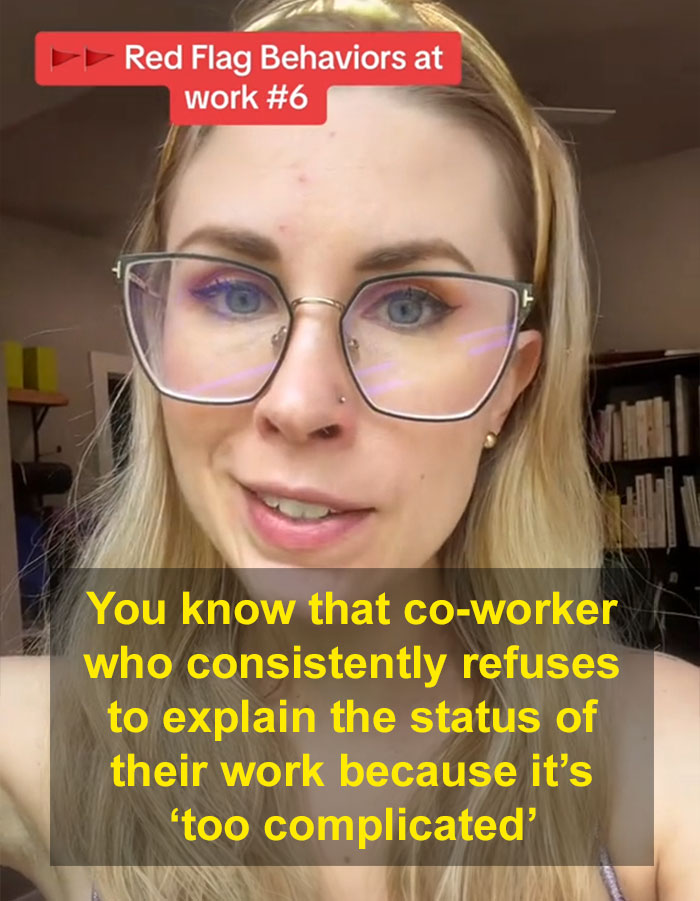 Red flag people in the workplace number 6: you know that co-worker who consistently refuses to explain the status or process of their work because it's 'too complicated'. They just kind of make it sound like it's a little above your head. I'm gonna say something that's gonna rile a lot of you up because I know a ton of you are going to be like, it's because they're narcissist sociopaths. Listen, there are a lot of reasons someone could be doing this at work. Yes, it could be because they're incompetent, or they genuinely think that they are better or smarter than the rest of you. But oftentimes what this behavior flags to me, as someone who has been in leadership and who's seen these people from all different angles, is that this person is really struggling with their workload. And deflecting all questions is kind of a desperation tactic to cover up for the fact that they are drowning in work. They are terrified to delegate, they have control issues. These things plague a lot of ambitious people, and not just because they're narcissists. If you're dealing with someone like this at the co-worker level, by checking in with them in a genuine tone, you can get them to show you a little vulnerability. They will be a lot more receptive to you telling them, 'Hey, I see your efforts, but here's how your behavior is affecting me as your teammate.'
Red flag people in the workplace number 6: you know that co-worker who consistently refuses to explain the status or process of their work because it's 'too complicated'. They just kind of make it sound like it's a little above your head. I'm gonna say something that's gonna rile a lot of you up because I know a ton of you are going to be like, it's because they're narcissist sociopaths. Listen, there are a lot of reasons someone could be doing this at work. Yes, it could be because they're incompetent, or they genuinely think that they are better or smarter than the rest of you. But oftentimes what this behavior flags to me, as someone who has been in leadership and who's seen these people from all different angles, is that this person is really struggling with their workload. And deflecting all questions is kind of a desperation tactic to cover up for the fact that they are drowning in work. They are terrified to delegate, they have control issues. These things plague a lot of ambitious people, and not just because they're narcissists. If you're dealing with someone like this at the co-worker level, by checking in with them in a genuine tone, you can get them to show you a little vulnerability. They will be a lot more receptive to you telling them, 'Hey, I see your efforts, but here's how your behavior is affecting me as your teammate.'
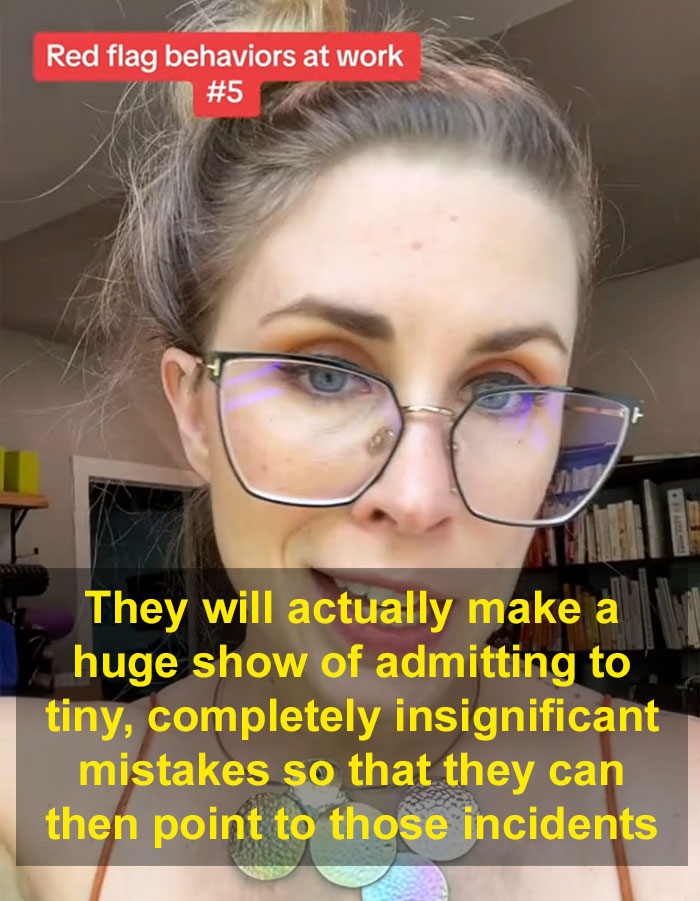 Red flag people in the workplace number 5: you will suffer more from this if the person doing it is in leadership over you, but this applies to anyone in the workplace. Okay, so there are, of course, people in the workplace who are so afraid of showing any vulnerability whatsoever that they will deflect and hide and lie, in order to avoid having to admit to any mistake whatsoever. But something more subtle I've seen from that type of person is that they will actually make a huge show of admitting to tiny, completely insignificant, no one gives a cr*p mistakes so that they can then point to those incidents and be like, 'Look, see, I own up to s**t?' Example, 'Hey, you know that unimportant completely innocuous email that I sent? I was supposed to send it to John Doe, but I accidentally sent it to John Deer. Accountability is so important. I apologize'. Of course, this is a very thin offense, and just know that if you do this, pretty much everyone sees right through it.
Red flag people in the workplace number 5: you will suffer more from this if the person doing it is in leadership over you, but this applies to anyone in the workplace. Okay, so there are, of course, people in the workplace who are so afraid of showing any vulnerability whatsoever that they will deflect and hide and lie, in order to avoid having to admit to any mistake whatsoever. But something more subtle I've seen from that type of person is that they will actually make a huge show of admitting to tiny, completely insignificant, no one gives a cr*p mistakes so that they can then point to those incidents and be like, 'Look, see, I own up to s**t?' Example, 'Hey, you know that unimportant completely innocuous email that I sent? I was supposed to send it to John Doe, but I accidentally sent it to John Deer. Accountability is so important. I apologize'. Of course, this is a very thin offense, and just know that if you do this, pretty much everyone sees right through it.
I do not completely agree with that. I'm working in quality management. And it's usually the best people who do this, impeccable work ethic, high quality output but a nasty bout of imposter syndrome. They are annoying, still I rather have ten people waffling on a spelling error in a website than one single person trying to pretend they don't make mistakes.
“Don’t expect perfection, expect a reasonable amount of honesty and transparency that treats you as an employee with a level of real respect. Leadership can’t always be 100% transparent, but they can give you enough to make you know that they actually give a shit,” she shared. If you want to find more of her work, you can check out her TikTok or LinkedIn page.
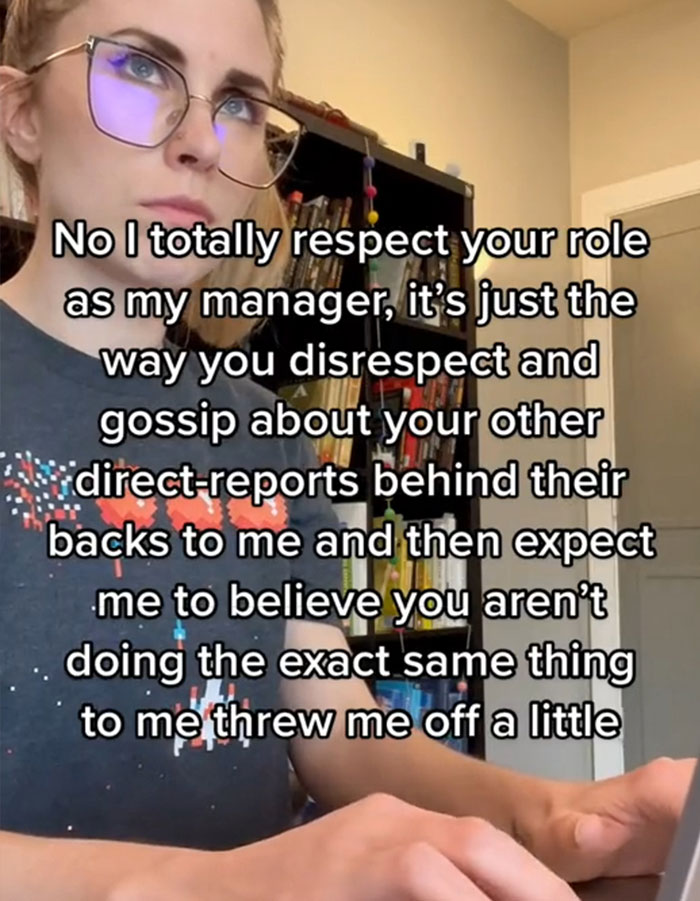
Image credits: themarissamoyer
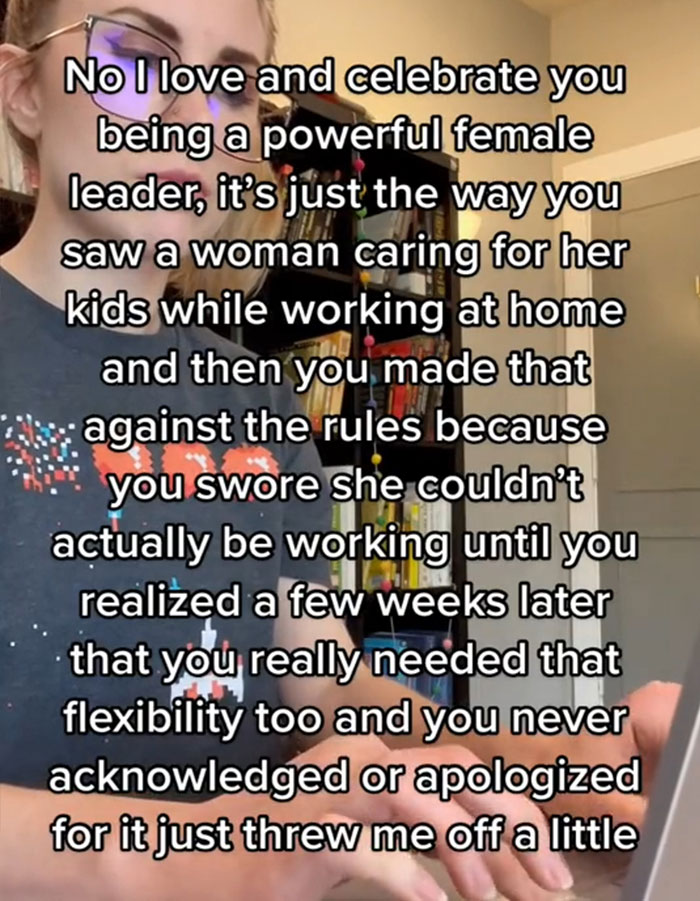
Image credits: themarissamoyer
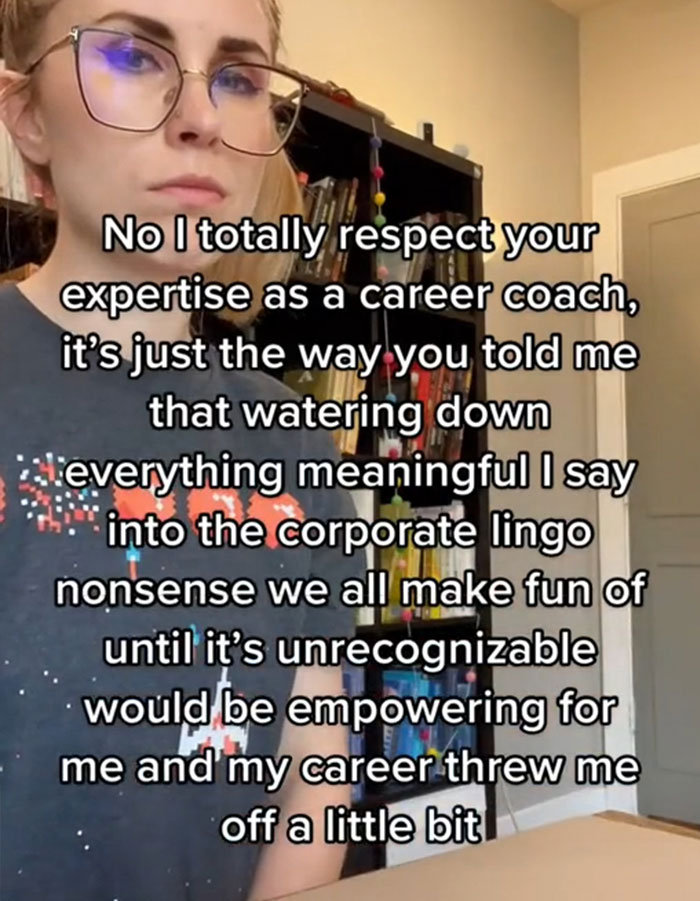
Image credits: themarissamoyer
Viewers shared their thoughts on workplace red flags
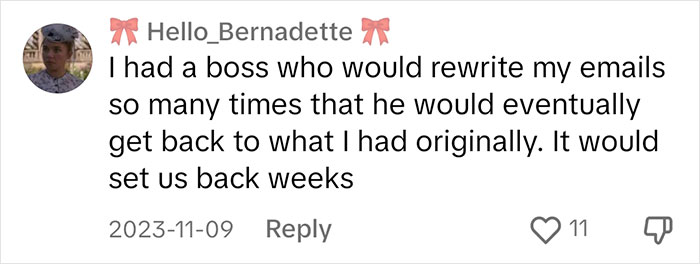





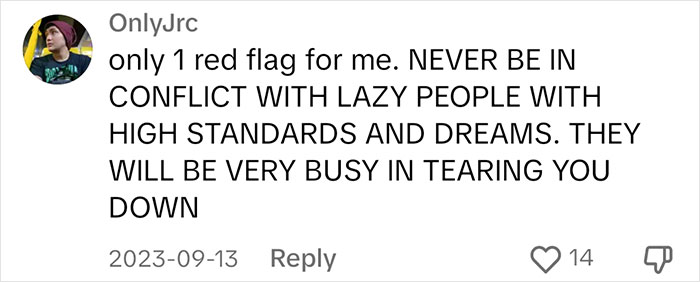
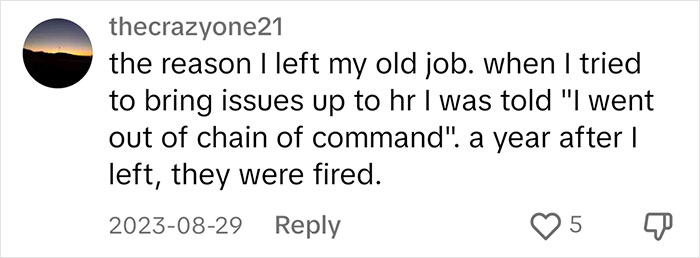


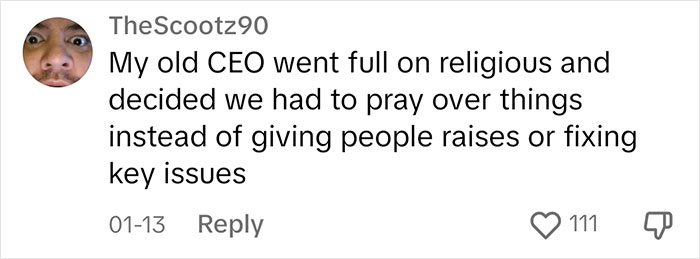
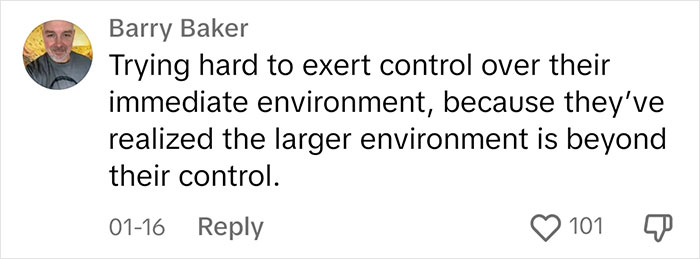
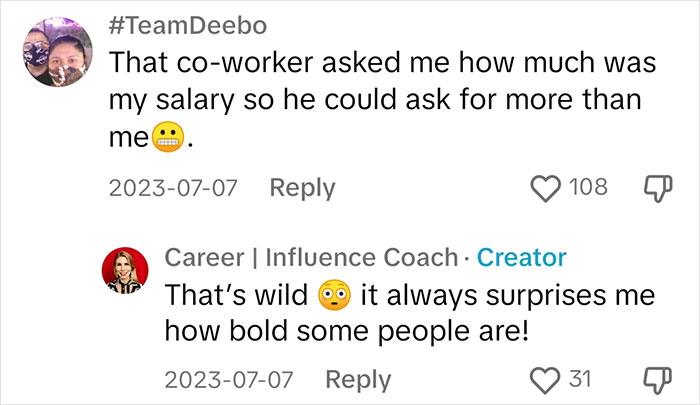
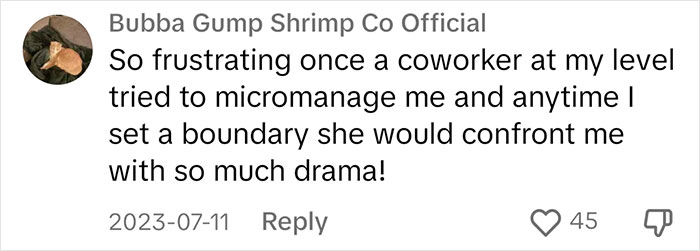
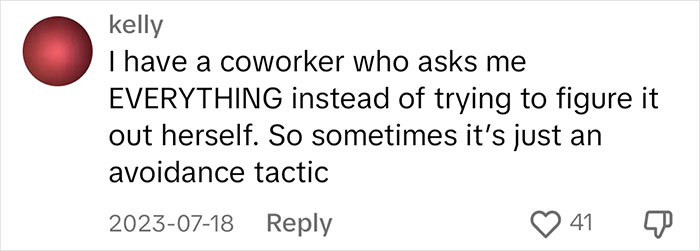

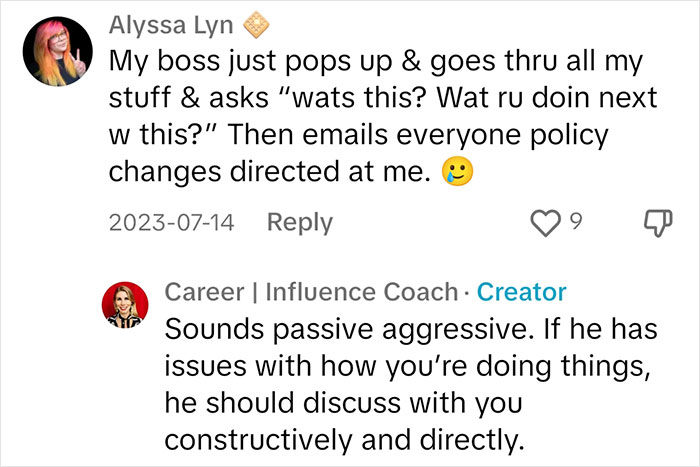

Can we PLEASE stop with the TikTok stuff where the images are basically selfies of the author with text overlay?
I feel like tiktok and professional are mutually exclusive terms.
Load More Replies...Hey BP, Knock if off with the tik tok stills. Just post the text. The pics are incredibly distracting and pointless. its really makes it bad to try and read. I just skip to down here and complain about it now. I gave up trying to follow that nonsense. no one with half a brain likes tiktok. Downvote
Sticking your giant ugly face into your phone camera is a major red flag.
Can we PLEASE stop with the TikTok stuff where the images are basically selfies of the author with text overlay?
I feel like tiktok and professional are mutually exclusive terms.
Load More Replies...Hey BP, Knock if off with the tik tok stills. Just post the text. The pics are incredibly distracting and pointless. its really makes it bad to try and read. I just skip to down here and complain about it now. I gave up trying to follow that nonsense. no one with half a brain likes tiktok. Downvote
Sticking your giant ugly face into your phone camera is a major red flag.

 Dark Mode
Dark Mode 

 No fees, cancel anytime
No fees, cancel anytime 


































































